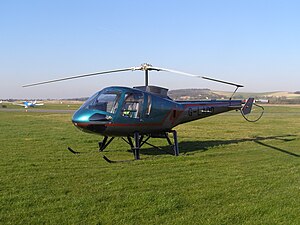Enstrom 480
| Enstrom 480 | |
|---|---|
 |
|
| A 1999 model Enstrom 480 | |
| Role | Light helicopter |
| Manufacturer | Enstrom Helicopter Corporation |
| First flight | 7 October 1989 |
| Introduction | 1993 |
| Produced | 1993-present |
| Number built | 142 (as of July 2011) |
| Unit cost |
$800,000
$1,100,000 (July 2011) |
| Developed from | Enstrom 280 |
The Enstrom 480 is a small, light helicopter produced by the Enstrom Helicopter Corporation.
In the 1980s the Enstrom Helicopter Company was producing two helicopters, both powered by horizontally-opposed piston engines. When the United States Army revealed a requirement for a turbine-powered training helicopter, the company designed a larger, turbine-powered version of its 280 Shark. The proposed unit was designated TH28 (TH for "training helicopter" derived from the 28(0), since the Army's proposal was NTH, "new training helicopter").
The Army contract effort was not successful, but the company effort looked promising enough that management committed to continue with a commercial version, which was introduced in 1993. Its power was provided by the C20W variant of the Rolls-Royce Model 250 turboshaft engine.
The 480 fuselage consists of a welded steel-tube framework with aluminum cover and tailcone. The pilot controls the aircraft from the left seat, which is unusual for helicopters. The aircraft does not have a hydraulic system; a trim system absorbs rotor feedback and allows the pilot to position the desired stick setting. The 480B engine is capable of producing 420 shp, but in this application it is limited to 305 shp for 5 minutes and 277 continuous shp, which is available to 13,000 MSL on a standard day. Thus hot-temperature or high-altitude operations have a considerable degree of confidence. The engine drives a three-bladed rotor of 32 feet diameter and a tail rotor of 5 feet diameter. The main rotor and hubs weigh a total of 300 pounds, so there is considerable inertia in the system during a loss of power. Autorotation landings are uneventful.
The aircraft us operated by a large number of small commercial and flight training operators, most operating one or two aircraft.
Data from The International Directory of Civil Aircraft, 2003-2004
General characteristics
Performance
...
Wikipedia
